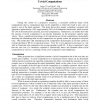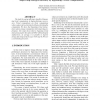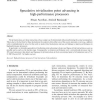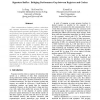24 search results - page 1 / 5 » Improving Processor Performance by Simplifying and Bypassing... |
ICCD
2002
IEEE
14 years 1 months ago
2002
IEEE
During the course of a program’s execution, a processor performs many trivial computations; that is, computations that can be simplified or where the result is zero, one, or equ...
IPPS
2005
IEEE
13 years 10 months ago
2005
IEEE
We study the energy efficiency benefits of bypassing trivial computations in high-performance processors. Trivial computations are those computations whose output can be determine...
JSA
2007
13 years 4 months ago
2007
Trivial instructions are those instructions whose output can be determined without performing the actual computation. This is due to the fact that for these instructions the outpu...
APCSAC
2006
IEEE
13 years 10 months ago
2006
IEEE
Abstract. Bypass delays are expected to grow beyond 1ns as technology scales. These delays necessitate pipelining of bypass paths at processor frequencies above 1GHz and thus affe...
HPCA
2004
IEEE
14 years 5 months ago
2004
IEEE
Data communications between producer instructions and consumer instructions through memory incur extra delays that degrade processor performance. In this paper, we introduce a new...




